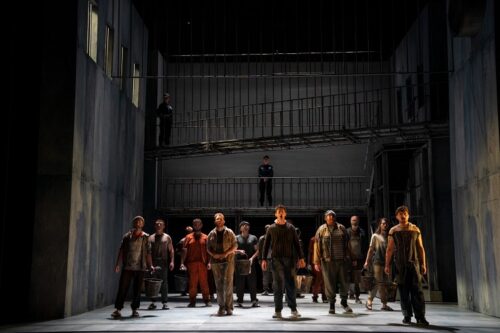 Ireland Beethoven, Fidelio: Soloists, Chorus and Orchestra of Irish National Opera / Fergus Sheil (conductor). Gaiety Theatre, Dublin, 13.11.2021. (RB)
Ireland Beethoven, Fidelio: Soloists, Chorus and Orchestra of Irish National Opera / Fergus Sheil (conductor). Gaiety Theatre, Dublin, 13.11.2021. (RB)

Production:
Director – Annabelle Comyn
Set and Costume designer – Francis O’Connor
Lighting designer – Paul Keogan
Fight director – Ciaran O’Grady
Assistant director – Katie O’Halloran
Chorus director – Elaine Kelly
Dialogue translator – Tom Swift
Cast:
Jaquino – Dean Power
Marzelline – Kelli-Ann Masterson
Leonore – Sinéad Campbell Wallace
Rocco – Daniel Sumegi
Don Pizarro – Brian Mulligan
Florestan – Robert Murray
First Prisoner – Jacek Wislocki
Second Prisoner – Matthew Mannion
Don Fernando – David Howes
Beethoven’s only opera, Fidelio, was written in the opening decades of the nineteenth century. The composer was a keen proponent of freedom and Republican ideals and these themes run strongly through the opera. The plot involves the incarceration of a political prisoner without trial and large-scale human rights abuses. These issues are even more relevant now than they were in Beethoven’s time as we see authoritarian regimes around the world crushing dissent and locking up people without trial. Beethoven’s original title for the opera, ‘Leonore, or the Triumph of Marital Love’ brings into focus the very personal story at the heart of the opera and extraordinary courage of the opera’s heroine. The opera is concerned with the struggle for justice and liberty and, as with much of Beethoven’s music, conflict and struggle permeate the score.
Annabelle Comyn’s production transfers the action from eighteenth century Seville to the present day. In the opening scene we see the main characters in Rocco’s modern-day office which is littered with laptops, desks and chairs. A series of fluid scene changes lead us to the tiered prison cells underneath. The prison wardens all wear blue shirts, dark trousers and caps while some of the prisoners (including Florestan) wear the orange jumpsuits of Guantanamo Bay. Don Pizarro wears a sharp suit and directs the guards to commit abuses from the shadows creating a link between the respectable political establishment and institutional abuse. In the spoken sections of the opera, the cast spoke in English and then sang in German. This worked surprisingly well and helped to keep the audience engaged with the unfolding narrative. The production underlined how relevant and important Beethoven’s themes are to the present day while enhancing the dramatic thrust of the opera.
Sinéad Campbell Wallace was superb in the role of Leonore. She struck just the right balance between concealing her true feelings from her fellow jailors while at the same time expressing her anxiety and desperation about the plight of her husband. In the famous ‘Abscheulicher’ aria she sustained the expressive lines beautifully while at the same time delivering the more dramatic material with gusto. I was particularly impressed with her singing in Act II’s great love duet with Florestan where the blazing joy of deliverance really shone through. Robert Murray was also very impressive in the role of Florestan. The cries of despair in his Act II aria were deeply affecting and his singing was imbued with feelings of sadness and anguish. He conveyed the pitiful nature of his plight very convincingly and the orange jumpsuit he was wearing reminded the audience that these matters are uncomfortably close to home.
Daniel Sumegi gave a convincing portrayal of the conflicted Rocco and he sang with warmth and power, although occasionally I would have welcomed a more focused sound. Kelli-Ann Masterson gave a good performance in the role of love-sick Marzelline and portrayed the character well. She sang with great authority although I would have liked more vocal projection on occasion. Brian Mulligan conveyed well the black heart of Don Pizarro and the dark timbres he brought to the music suited the character perfectly. Dean Power made a strong impression as Jaquino and I came away from the evening wanting to hear more of his singing.

Fergus Sheil ensured cast, chorus and orchestra remained on track throughout the evening. The Overture had energy and dynamism and the strings and horns were particularly impressive. Sheil’s pacing of the material was spot on and the balance between singers and orchestra was generally pretty good. The cast and orchestra did well with the ensemble set pieces. I loved the luminous glow which Sheil summoned from the strings in Act I’s glorious ‘Mir ist so Wunderbar’ while the soloists blended beautifully in their ensuing entries. The chorus were also very impressive and the Prisoners’ Chorus in Act I was profoundly moving.
Overall, this was an impressive performance from Irish National Opera featuring first-rate singing and playing.
Robert Beattie
